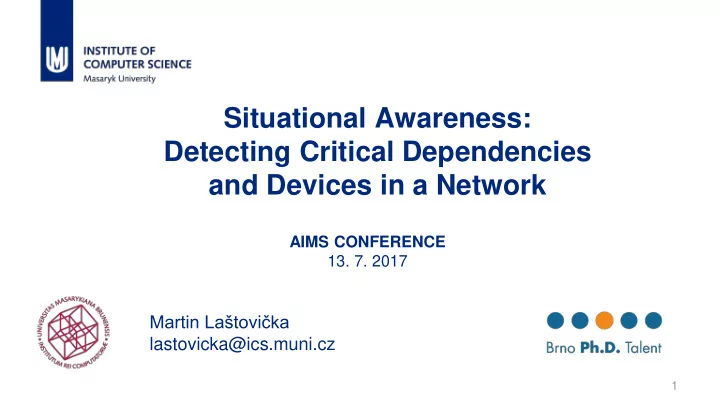

Situational Awareness: Detecting Critical Dependencies and Devices in a Network AIMS CONFERENCE 13. 7. 2017 Martin Laštovička lastovicka@ics.muni.cz 1
Situational Awareness The knowledge and understanding of the current situation. 2
3
4
Motivation ▪ Automatic building of situational awareness ▪ Ever-evolving threat landscape and network threats ▪ Threat impact estimation with respect to current situation 5
Research Questions 1. How can device and its services be identified in a complex network using passive network monitoring? 2. How can device dependencies be detected in a network? 3. How can device importance be estimated from the perspective of reaction to cyber threats? 6
RQ1: Device and Service Identification 7
8
How? ▪ TCP stack ▪ Service identifier ▪ Specific domains ▪ Port ▪ HTTP hostname ▪ Traffic characteristics ▪ HTTPS SNI ▪ User-agent 9
Methods ▪ Extended flows – IPFIX ▪ More information from L3, L4, L7 headers ▪ How to update? ▪ Machine learning ▪ Autonomous characteristics identification ▪ How to scale? 10
RQ2: Detection of Device Dependencies 11
How? ▪ Client-server communication ▪ Traffic characteristics 12
RQ3: Importance Estimation 13
How? ▪ Device identification ▪ Provided services ▪ Traffic statistics ▪ Number of dependencies ▪ Attack statistics 14
Methods ▪ Graph algorithms ▪ Graph centrality ▪ Clique detection ▪ Analysis of attackers activities ▪ Type of attack ▪ Duration, repetition, number of targets 15
Preliminary Results ▪ OS recognition in real network ▪ Experiments with flow based passive identification ▪ Encrypted traffic – ocsp protocol ▪ Graph-based data model ▪ Machines and relations ▪ Computations over data ▪ Attack targets analysis ▪ Generic attacks (scans) on workstations/dynamic ranges ▪ DoS, brute force attacks on servers 16
Discussion Martin Laštovička lastovicka@ics.muni.cz Brno Ph.D. Talent Scholarship Holder – Funded by the Brno City Municipality 17
Recommend
More recommend